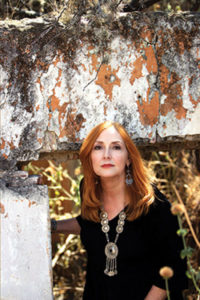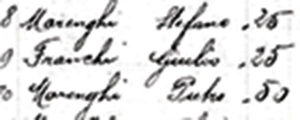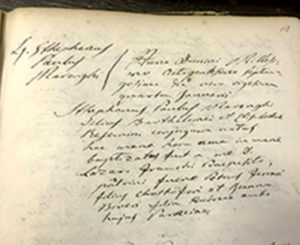By Brett Peruzzi, Contributing Writer

Milford/Wareham – Catherine Marenghi’s first book, Glad Farm, was a searing memoir of her years growing up impoverished on the outskirts of Milford, in a one-room ramshackle house built by her father, that had no indoor plumbing and was heated only by a wood stove.
The 65-year-old author’s latest book delves deeper into her family roots, but this time, it will be a historical novel.
“Initially my intent was to write a prequel to my memoir, to tell more of the story of my Italian immigrant family,” she explained. “I soon realized how little I really know about their lives. I decided to choose the historic fiction form to tell a universal story of immigrants to America, but not as a pedantic history. I wanted to tell stories, interesting stories, about real people – most of whom died before I was born.”
Marenghi has dedicated countless hours to learn more about those family members who came before her.
“I have done, and continue to do, extensive research on family genealogy and the historic context of my family’s lives from about 1870 through 1940. It was really a rich time in Milford history,” she noted. “Nicola Sacco, of Sacco and Vanzetti fame, lived there many years, and he is part of my story. There were violent labor strikes in the nineteen-teens, and there was the Spanish flu.”
And unlike many ordinary novels, Marenghi will use a historically accurate framework.
“The ‘bones’ of my story – names, dates, places, events – will be factual,” she said. “But the connective tissue between those bones – the characters’ stories, dialogue, and personality traits – will be, of necessity, almost entirely imagined.”

Her research has taken her all the way from Internet searches on her laptop to Italy.
“I subscribed to Ancestry.com for years, but its records on Italy were very spotty,” she recalled. “It was only after I launched my book Glad Farm at the Milford Town Library in 2016 that I met a wonderful family, the Volpicellis, cousins of mine by marriage, and they knew exactly where my family originated.”
“They came from the same town and have maintained ties to the place. With their guidance, I was able to go to the village of Metti di Bore, province of Parma, a little village in the Apennine Mountains, in April of 2019,” Marenghi explained. “There I was allowed to look at the ancient record books at the church of San Leonardo Abate. Huge books with yellowed pages, written entirely by hand in Latin. And would you believe the first page I opened to was the January 1870 record of my grandfather Stefano Marenghi?”

“I was also fortunate to visit the tiny frazione or hamlet of Pereto, part of Metti, and to find that the old house of my great uncle Pietro, my grandfather’s older brother, was still standing. My grandfather’s house, long destroyed, would have been nearby,” she noted. “It was so important to see this village, a physical place I could not have imagined, to bring my story to life.”
“My research is not complete as of yet,” Marenghi, who divides her time between San Miguel de Allende, Mexico and the town of Wareham on Cape Cod, emphasized. “My hope to spend more time in the Milford Town Library, specifically to research old newspaper articles, has been put on hold due to the coronavirus. My research has also included many books, online searches, and conversations with descendants of Italian immigrants in my home town. Their stories have helped me add color and richness to my story.”
The result, she said, will be a book that is a series of first-person narratives, each told in the voice of a different ancestor.
“My hope is that people will see, and be sympathetic to, the universal immigrant story in my book,” she said. “I see something in common among all immigrants, anywhere on earth, at any time in history – they are all people who just want a better life for their children.”
Earlier this year, Marenghi, who is also a long-time poet, published her first book of poems, Breaking Bread, which, like her prose, focuses on themes of life, loss, and longing in the context of family relationships.
“I consider myself a poet at heart, and I approach everything through the lens of poetry,” she reflected. “I try to use lyrical language to bring vivid images to all my work, because imagery is where you connect with readers.”
Marenghi offered this advice for other older creative writers, especially those who are trying to begin or increase their commitment to their craft in their later years.
“I would recommend taking writing workshops and classes, joining writers’ groups, and attending conferences to learn more about the world of writing and publishing, including the various options for publishing – self, traditional, and hybrid – and to get inspiration from other writers,” she advised. “It is so important to share your work with other writers, for learning and encouragement as well as continual improvement.
“And don’t be discouraged if you submit your work for publication and it gets rejected. Don’t be afraid of rejections,” she said emphatically. “And keep on trying!”
More information about Catherine Marenghi and her writing can be found at https://www.marenghi.com
Photos/submitted












